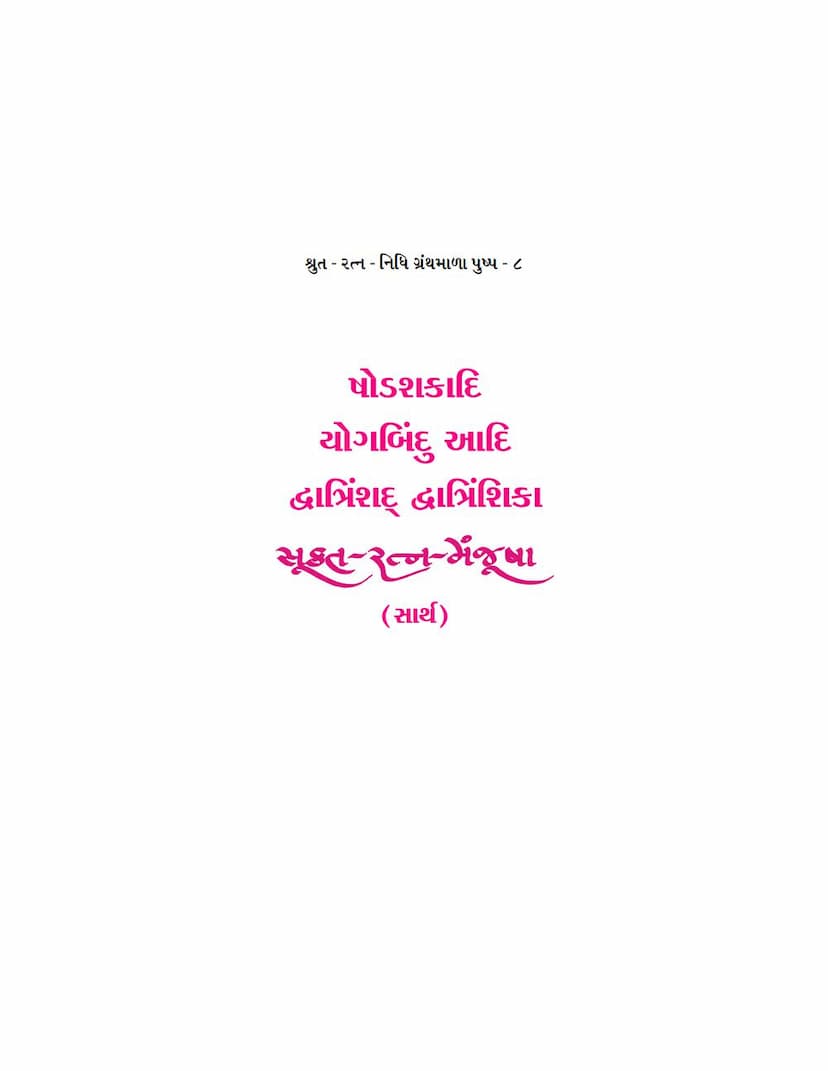Sukta Ratna Manjusha Part 08 Shodshakadi Yogbindu Aadi Dwatrinshad Dwatrinshika
Added to library: September 2, 2025

Summary
This document is the eighth part of the "Shrut Ratna Nidhi Granthamala" series, titled "Shodashakadi Yogbindu Aadi Dwattrinshad Dwatrinsika," authored by Muni Bhavyasundarvijay. It is published by Shramanopasak Parivar. The book is a collection of selected verses (Gathas) from various Jain scriptures, compiled with the intention of making them easier to memorize and understand.
The primary goal of this publication is to revive the tradition of memorizing Jain scriptures, which has declined in recent times due to the vastness of the original texts and the diminishing memory capacity of people in the current era. The editor, Muni Bhavyasundarvijay, has carefully selected verses that are particularly impactful, spiritually uplifting, and easy to retain.
Key themes and content highlighted in the document:
- The Importance of Memorization: The preface and editorial sections emphasize the historical and spiritual significance of memorizing Jain verses, citing examples of great monks who were known for their vast memorization abilities. It acknowledges the difficulty in memorizing entire large texts today and proposes this collection as a solution.
- The Concept of "Saroddar" (Summary/Essence): The practice of extracting the essence of larger texts is presented as a valuable tradition that makes profound spiritual knowledge accessible to more people. This publication follows that tradition.
- Selection Criteria for Verses: The verses are chosen based on their ability to evoke detachment (vairagya), their ease of memorization, their clear meaning, and their overall usefulness for spiritual growth.
- Organization of the Text: The verses are not presented in the original scriptural order but are grouped by similar themes to facilitate understanding and memorization. The original verse numbers from the source texts are provided for reference.
- Content from Various Sources: The book draws from several key Jain texts, including:
- Dharmabindu: Focuses on the nature of Dharma, its benefits, and the path to spiritual advancement. It discusses detachment, the importance of good conduct, and the efficacy of righteous actions.
- Shastra Vartasamuchchay: Discusses principles of righteous living, the importance of virtue, the nature of suffering and happiness, and the ephemeral nature of worldly possessions.
- Ashtak Prakaran: Explores themes related to knowledge, detachment, the nature of karma, and the path to liberation.
- Yogabindu and Yogadrishti Samuchchay: These texts are central to the book, focusing on various aspects of Yoga in Jainism, including its importance, different types of yogis, the stages of spiritual practice, and the nature of liberation. It delves into the eightfold path of yoga, emphasizing right knowledge, right conduct, and right meditation.
- Dwatrinshad Dwatrinsika: This section appears to be a collection of verses on various topics, including the significance of donation, the importance of intention, the nature of virtue and vice, the importance of pleasing the Guru, the significance of Jinism, and the pitfalls of deviating from the path. It also discusses different types of renunciates and the characteristics of ideal spiritual practitioners.
- Spiritual Teachings: The verses offer profound spiritual guidance, including:
- The ephemeral nature of the worldly existence and the importance of seeking spiritual liberation.
- The necessity of detachment from worldly pleasures and possessions.
- The role of right faith, right knowledge, and right conduct (Trividha-Marga) in achieving liberation.
- The importance of devotion to the Guru and the path shown by the Tirthankaras.
- The need for inner purity and the cultivation of virtues like compassion, forbearance, and equanimity.
- The dangers of attachment, desires, and negative emotions like anger and pride.
- The path of Yoga as a means to overcome worldly suffering and attain ultimate bliss.
- Acknowledgement and Gratitude: The book expresses gratitude to the Tirthankaras, the great acharyas (like Haribhadrasuri and Yashovijayji), the gurus who provided inspiration and guidance, and all those who contributed to its publication.
In essence, "Shodashakadi Yogbindu Aadi Dwattrinshad Dwatrinsika" is a valuable resource for Jain ascetics and lay practitioners alike, offering a curated selection of verses that encapsulate essential Jain teachings in an accessible and memorable format. It aims to rekindle the tradition of scriptural memorization and thereby deepen the understanding and practice of Jain philosophy.